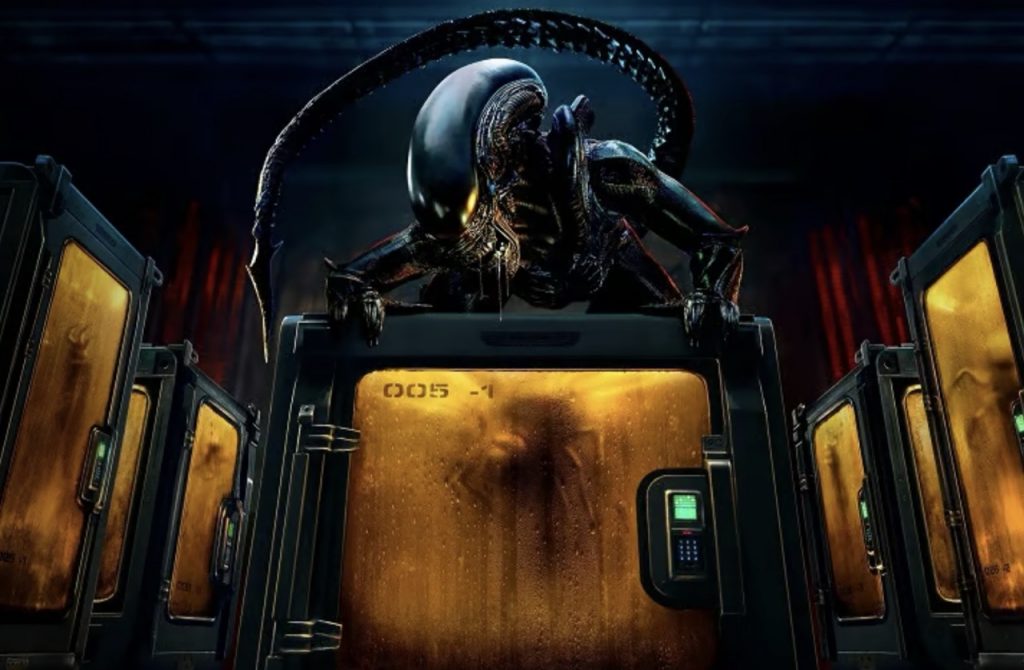FX have placed their trust in Fargo and Legion show runner Noah Hawley to breathe new life into the Alien canon via an expanded universe series. Fans will be hoping for a full-on chest burster rather than a damp squib; should they get their hopes up, or expect their sulphuric blood to boil?
Much like the beleaguered Terminator franchise, Alien is a property in desperate need of a shot in the arm. A string of mediocre-at-best movie sequels over the course of the last couple of decades have done little to build on worlds or mythology, and much to bear testament to the tenacity of a fan base that refuses to give up hope.
Stepping up to the plate here we have Noah Hawley, creator and writer of TV spin-off series Legion and Fargo, a pedigree that makes him a pretty good choice, on paper at least, to tackle this much-needed resuscitation attempt of a dearly loved property. I’ll avoid spoilers, but let me jump straight to a conclusion of sorts: the results are mixed.
Starting promisingly, if predictably, with a bit of obvious fan service, the first episode centres of the crew of the Maginot, a deep space research vessel registered to the infamous Weyland-Yutani corporation, who awake from cryogenic sleep for a quick breakfast round table and an impending catastrophe. In short, a navigation error means the ship will soon plunge to Earth, which would be inconvenient enough were it not also carrying a menagerie of recovered hostile alien species. So far so entertaining, if somewhat predictable.
Parallel to this we share time with Marcy Hermit, a terminally ill young girl who, at the machinations of the rival Prodigy corporation and it’s founder Boy Kavalier, is offered a shot at eternal life in exchange for her consciousness being side-loaded into a synthetic adult body. She’ll be the first of her kind, but not the last, being joined in short order by a group of similarly debilitated youths who become, along with Kavalier, a desperately shoehorned analogy for Peter Pan and the Lost Boys.
It’s these two interweaving plot lines that propel the show forward, and promising as they both are they often feel like they somewhat trip each other up. It’s convenient, for plot reasons if not credibility, that the Maginot crashes to Earth in New Siam, a Prodigy-owned city within which Marcy’s older brother Joe works as a medic for the corporation-owned military. Believing his younger sister to have died, it comes as news to Joe that she’s now knocking about in a synthetic body, replete with superhuman powers that come and go as the plot demands, meaning she now often finds herself her older brother’s protector.
This revelation comes about as Joe happens to be a Magino first responder, and is immediately placed in jeopardy by the now-freed alien species Weyland-Yutani would desperately like back, but which Prodigy assert domain over so long as removing the crashed ship would risk causing more damage and loss of life. Again, on paper it seems like a pretty decent recipe for a cocktail of corporate skulduggery with body horror trappings, and were it effective in its aims I’d forgive it its more credulity-stretching transgressions.
Unfortunately Alien: Earth falls somewhat afoul of that old balancing act of serving two audiences, and in attempting to have its cake and eat it it ultimately struggles to satisfy either the existing fan base or the new audience it would like to cultivate. That’s not to say there aren’t a lot of things to like; the production values are excellent, the cast almost uniformly great, and there’s some cool creature design that I really, really wish was leveraged to lean more into grotesquery. It’s a classic case of two steps forward, one step back, and while that still equates to overall forward momentum (at least, I suspect, as far as existing fans will be concerned) I don’t know that things are moving in the direction which will serve the franchise best in the long run.
Still, we have face huggers, chest bursters, xenomorphs and pulse rifles, plus the addition of a super-intelligent eyeball monster (less dorky than it sounds) and a couple of other invasive species with their own USPs, and for some that may all be enough. On balance I’d probably rather have relegated the done-to-death creature elements to an occasional side show in favour of some more satisfying character development, as over the course of eight episodes it doesn’t feel like Hawley gets much work done in that respect, but as always opinions are subjective and your mileage may vary.
I’ll give the inevitable season two a couple of episodes to win back my loyalty when it rolls around, but with streaming rival Apple currently pumping out absolutely first rate sci-fi series like Invasion, Foundation and For All Mankind to name but a few I’m not necessarily satisfied with “good enough.” Step it up, Noah.
Author: Ewan, Chester Store







